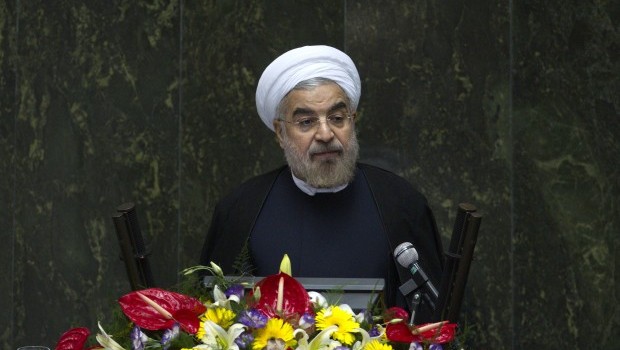
Iranian President Hasan Rouhani speaks during a debate in parliament on his proposed cabinet, in Tehran, Iran, Monday, Aug. 12, 2013. (AP Photo/Ebrahim Noroozi)
London, Asharq Al-Awsat—On Saturday, Iranian president Hassan Rouhani reiterated his commitment to tackling Iran’s longstanding economic problems within the ambitious 100-day timeframe he gave himself during his election campaign.
While Rouhani warned that the Iranian economy is in a state of “inflationary recession” that would complicate recovery, he reassured Iranians that his government has identified the most serious issues facing the economy. He added that specific working groups have been established to address the issues.
The remarks came during a question and answer session with a number of journalists as the new president was paying homage to the late supreme leader, Ayatollah Ruhollah Khomenei, at his shrine just south of Tehran. The last week of August is “Government Week” in Iran, an act of commemoration of the 1981 assassination of President Mohammad Ali Raja’i. It is customary for the president and his cabinet to visit the shrine of the late supreme leader on the first day of Government Week.
Iran’s economy has come under enormous pressure in recent years, mostly due to Western-imposed sanctions and the financial restrictions that prevent doing business in dollars, euros or pounds sterling.
It remains unclear what concrete steps will be taken by Rouhani’s economic team, especially given that he has not yet installed a new central bank governor. There has been little concrete policy guidance on taxation, interest rates or the state budget from the Cabinet so far.
However, the president has specifically reassured Iranians that sufficient stocks of basic commodities, including wheat, have been purchased, ensuring there will be no shortages before the end of the current Persian year on March 21, 2014.
While economic policy was a cornerstone of Rouhani’s election campaign, he also ran on a platform that promised to resolve Iran’s difficulties with the international community.
On Saturday, Rouhani also strongly condemned the use of chemical weapons in Syria.
Noting that the Islamic Republic of Iran has itself been a victim of chemical weapons attacks, he said that his government “unequivocally denounces the atrocities taking place in Syria,” which he said have led to the “martyrdom” and “suffering” of many innocent citizens.
This comment came at a time when Iran is trying to address both foreign and domestic policy challenges.
Last week, Iranian foreign minister Mohammad Javad Zarif told Iranian state TV that that the previous administration’s methods could not have secured Iran’s national interest.
Zarif’s appointment was widely seen as a sign to the West that the Rouhani Administration is seeking reconciliation, and the new minister has promised to change the tone of Iranian foreign policy in the hope of reaching mutually agreeable solutions.
Details on Iran’s new foreign policy approach are still being revealed, and the chief nuclear negotiator has yet to be appointed. It was initially believed that Zarif would be given the task.
Iran’s new government has also not fleshed out its position on Syria, and it is not yet clear what direction it would take if armed conflict spills over into Lebanon.

No doubt economy recovery is a big challenge to newly elected Rouhani. Iran’s economy has been weakening since Ahmedinejad time. Beside existing weakness, sanction by western also contributed to the weakness. Rouhani has to face two main courses, internal and external. How iffective his measure is depending to how briliant he handle the crisis. The economy is so complicated. It shall be looked from many angle and view point. 100 days is such a short time. Very dificult to address such complicated crisis within a short time. I opined Rouhani has made a mistake when he said want tackle the problem in 100 days.
Challenge from sanction is more problematic. It is closely related to unsolve 5+1 talk with west. The sanction has a momentum to penalise Iran more seriously. Currency attack has taken place for years. Iran people now less rich 3-4 fold. Iran has become relatively poor in international biz. Wealth from O&G reserve does not make Iran people have a strong purchasing power. All the problems are due to the sanction. If Rouhani does not look seriously how the sanction -that is close related to Iran’s neuclear programs- can be lifted, the 100 days he promised to tackle the economy is baseless promise.
Mr. Rouhani has not promised that, he would solve all economic problems in the country within 100 days but, he would specify the economic challenges in the economy within the period an then will put a concrete schedule tackling the issue.